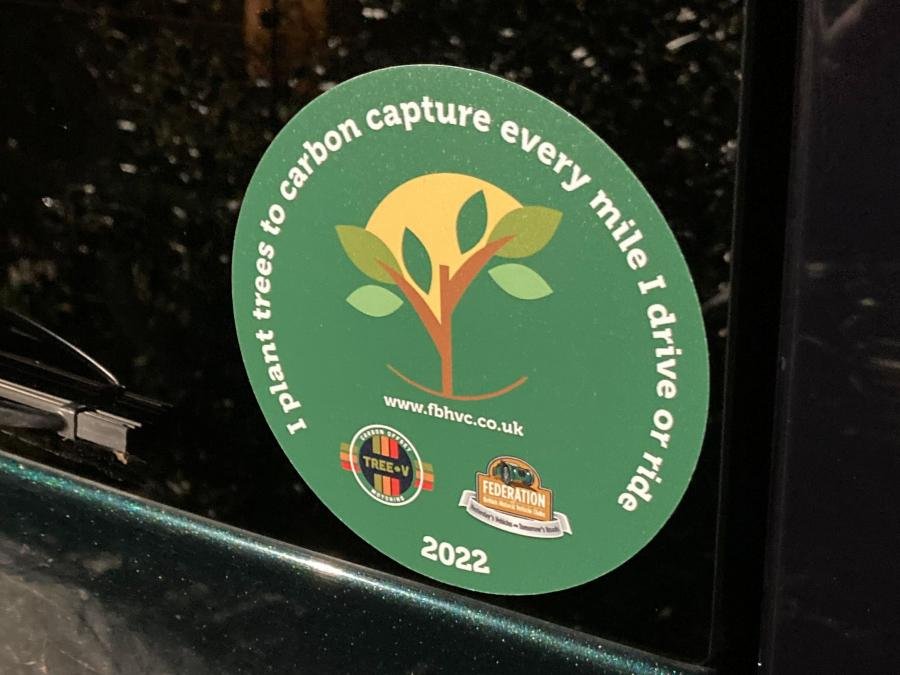Episode 73: Could planting trees really keep our MGs on the road?
Following the announcement that the MG Car Club are to offer owners of historic MGs the opportunity to carbon offset their mileage, we interview Tom Worthington from Tree-V who administer the scheme for the MGCC and FBHVC, to find out more about how the scheme works and whether it really makes a difference to the emissions challenge we all face.
Plus we round up the latest from the world of MG.
Mike Haughton MGCC Director says, “The MG Car Club, as a member of the Federation of British Historic Vehicle Cubs is pleased to announce that we have developed a ‘Carbon Offset’ scheme that may be of interest to members – unless of course you already have an MG ZS EV or MG 5!
It is a voluntary scheme that overall should help the environment – and you get a car sticker to show you are doing your part.”
Full details are on the FBHVC website and you can read the full announcement from the Federation below.
Historic vehicle owners and event organisers can now continue their enjoyment of transport heritage, whilst playing their part to protect the environment, through a new carbon balancing initiative from the Federation of British Historic Vehicle Clubs (FBHVC) delivered in partnership with Tree-V.
The scheme, launched on 15 December 2021, offers individuals, clubs and those organising events within the historic vehicle community a quick and convenient way to carbon balance their emissions thanks to the planting of new woodland here in the UK. Importantly, that woodland will also be planted using native species to best contribute to the local ecosystem. Planting in this way also delivers a host of additional benefits, including increased biodiversity, creation of recreational spaces and flood mitigation to name a few.
The carbon footprint of the average historic vehicle is already very low. FBHVC research data shows that, on average, the historic vehicle community accounts for less than 0.25% of the total miles travelled on UK roads annually and that includes everything from cars, motorcycles, buses, coaches, lorries, light commercials, military, agricultural and steam vehicles. Furthermore, the manufacturing footprint of the vehicle has been spread over so many years, that it has more than ‘paid its dues’ in terms of the emissions and energy required to produce it.
However, as the responses to the 2020/2021 National Historic Vehicle Survey showed, there is an appetite within the historic vehicle community to work towards carbon neutrality. Over a third of historic vehicle owners said that they would support contributing to some kind of carbon balancing scheme in order to continue to use their historic vehicles and the Federation have responded to that request.
The FBHVC were keen to secure a partner who could provide a solution covering both individuals through to clubs and events and set about a detailed programme of research lasting nearly two years. The research, initially led by the then Environmental Director for the FBHVC, Peter Spours sought to develop a capture programme that could cover the full portfolio of historic vehicles, not just cars. The programme needed to be scientifically sound, have a positive and tangible impact on the environment and be delivered through a simple capturing service on the Federation’s own website (https://trees.fbhvc.co.uk) to allow every individual to feel confident in their contributions to the initiative and the planet’s future.
The FBHVC, as a result of that research, has partnered with Tree-V to tailor bespoke packages for Federation members. The scheme provides a pricing structure that covers all the vehicle categories in the FBHVC family, in bands that reflect each vehicle type’s average usage. Tree-V are partnered with Forest Carbon, who have planted over 13 million trees, are certified by the Woodland Carbon Code which, in turn, is supported by the UK government and internationally recognised by ICROA (International Carbon Reduction and Offset Alliance).
The team at Tree-V are also a perfect fit because they are all historic vehicle enthusiasts. In fact, the scheme was born out of their passion for their Morris Minor named Myrtle! Tom Worthington of Tree-V explains, “As much as our pride and joy attracts lots of positive attention for the nostalgia it evokes, it can also attract attention for having an exhaust pipe. If we want to keep our beautiful machines relevant and responsible in the 21st century, we need to recognise how some sections of society might view them. Making our vehicles eco-friendly, and shouting about it, is a way we can secure the future of our community and attract the next generation of enthusiasts.”
David Whale FBHVC Chairman said,
“The United Nations Climate Conference, otherwise known as COP26, held in November 2021 highlighted to a public with already increased interest in tackling the climate crisis, the impact that vehicle emissions have on the planet. The resolutions passed at COP26 laid a clear path to how the government will be turning our transport networks green and the FBHVC is working constantly on how the historic vehicle sector can adapt to ensure our current freedoms to enjoy our historic vehicles last long into the future.”
To carbon balance historic vehicle mileage, owners can simply head to https://trees.fbhvc.co.uk, select their vehicle type and select how many miles they do a year. It couldn’t be easier, or cheaper, for example a historic car can be balanced for as little as £20 per year. Once the transaction is complete, the historic vehicle owner receives a pack through the post from Tree-V containing information on how the money is being used and also a sticker for the vehicle to show that its mileage for that year has been carbon balanced. Each year, new coloured and date stamped stickers will be released to keep carbon offsetting up to date.
The Federation’s carbon balancing programme caters for all historic vehicles including cars, motorcycles, buses, coaches, lorries, light commercials, military, agricultural and steam vehicles and the FBHVC have kickstarted the scheme with the purchase of 1,000 trees to be planted in Tom’s Wood, Near Castle Howard, North Yorkshire.
For events, organisers can contact the FBHVC and Tree-V to have a bespoke package tailored for their specific event by filling out the event organisers application form at https://trees.fbhvc.co.uk .
Early adopters of this bespoke scheme from within the Federation membership already include Club Triumph who will be offsetting their Coast to Coast Run for Triumph vehicles in 2022. Another, the TR Register’s relay run for the first ever Triumph TR built in right-hand drive, will see the car touring the club’s many regions with all the mileage offset through the Federation scheme.
The steam community have also welcomed the initiative with a spokesperson from The National Traction Engine Trust (NTET) saying, “The NTET are pleased to affiliate with the FBHVC in its initiative to fund a Carbon Capture scheme in partnership with Tree-V. The NTET is looking forward developing a version of the scheme which will be amenable to its members”.
Tom Worthington from Tree-V sums up the motivations behind the initiative,
“We’re incredibly indebted to the combustion engine and the way it has shaped the society we live in today. Therefore, we passionately believe that all our historic vehicles, regardless of their size, whether they are driven or ridden, should continue to be turning their wheels and racking up the miles. But let’s make those miles green by offsetting and capturing those emissions!”
Carbon balance your historic vehicle mileage for 2022 now at: https://trees.fbhvc.co.uk .
Do you have an interesting story to tell? Why not get in touch and we will interview you on the podcast as well!
Subscribe in:
ITUNES | SPOTIFY | GOOGLE PODCASTS

